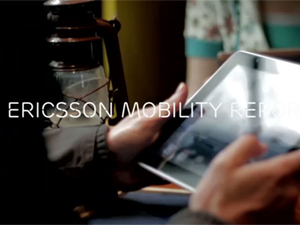



Date:20/02/16
 Ericsson has released a new issue of Mobility Report that was prepared specially for the Mobile World Congress. The document reveals the impact of different levels of network performance on smartphone users and their perceptions of mobile operators and digital content providers.
Ericsson has released a new issue of Mobility Report that was prepared specially for the Mobile World Congress. The document reveals the impact of different levels of network performance on smartphone users and their perceptions of mobile operators and digital content providers.
Neuroscience technology was used to objectively measure emotional responses to varied smartphone experiences. Delays in loading web pages and videos under time pressure caused mobile users' heart rates to raise an average of 38 percent. Six-second delays to video streaming caused stress levels to increase by a third. To put that in context, the stress incurred is equivalent to the anxiety of taking a math test or watching a horror movie alone, and greater than the stress experienced by standing at the edge of a virtual cliff. Once a video begins, an additional pause can cause stress levels to increase dramatically.
In the study, the Net Promoter Score (NPS) of an operator increased significantly when associated with a delay-free experience - by 4.5 points. This finding was also reflected when measuring emotional engagement using a neuroscience-based motivational index.
However, the operator's NPS dropped on average four points with moderate time-to-content and re-buffering delays. Interestingly, moderate delays result in a double negative for mobile operators: decreased engagement with their brand and increased engagement with competitors. Other highlights from the Ericsson Mobility Report - Mobile World Congress edition, include:
- Social networking is second only to video for driving mobile traffic growth. Over the next six years total social networking traffic will be around 12 times that of the previous six years
- 68 million mobile subscriptions added in Q4 2015, India added the most (21 million), followed by China (6 million), the US (5 million), Myanmar (5 million) and Nigeria (3 million)
- Total number of mobile subscriptions in Q4 2015 reached 100 percent penetration at around 7.3 billion - the same number of mobile subscriptions as people in the world
- Global mobile data traffic grew 65 percent between Q4 2014 and Q4 2015
- There are now one billion LTE subscriptions worldwide, with approximately 160 million additions in Q4 2015.
Streaming delays mentally taxing for smartphone users: Ericsson Mobility Report
 Ericsson has released a new issue of Mobility Report that was prepared specially for the Mobile World Congress. The document reveals the impact of different levels of network performance on smartphone users and their perceptions of mobile operators and digital content providers.
Ericsson has released a new issue of Mobility Report that was prepared specially for the Mobile World Congress. The document reveals the impact of different levels of network performance on smartphone users and their perceptions of mobile operators and digital content providers.Neuroscience technology was used to objectively measure emotional responses to varied smartphone experiences. Delays in loading web pages and videos under time pressure caused mobile users' heart rates to raise an average of 38 percent. Six-second delays to video streaming caused stress levels to increase by a third. To put that in context, the stress incurred is equivalent to the anxiety of taking a math test or watching a horror movie alone, and greater than the stress experienced by standing at the edge of a virtual cliff. Once a video begins, an additional pause can cause stress levels to increase dramatically.
In the study, the Net Promoter Score (NPS) of an operator increased significantly when associated with a delay-free experience - by 4.5 points. This finding was also reflected when measuring emotional engagement using a neuroscience-based motivational index.
However, the operator's NPS dropped on average four points with moderate time-to-content and re-buffering delays. Interestingly, moderate delays result in a double negative for mobile operators: decreased engagement with their brand and increased engagement with competitors. Other highlights from the Ericsson Mobility Report - Mobile World Congress edition, include:
- Social networking is second only to video for driving mobile traffic growth. Over the next six years total social networking traffic will be around 12 times that of the previous six years
- 68 million mobile subscriptions added in Q4 2015, India added the most (21 million), followed by China (6 million), the US (5 million), Myanmar (5 million) and Nigeria (3 million)
- Total number of mobile subscriptions in Q4 2015 reached 100 percent penetration at around 7.3 billion - the same number of mobile subscriptions as people in the world
- Global mobile data traffic grew 65 percent between Q4 2014 and Q4 2015
- There are now one billion LTE subscriptions worldwide, with approximately 160 million additions in Q4 2015.
Views: 1090
©ictnews.az. All rights reserved.Similar news
- 24% of U.S. Adults have made phone calls on the Internet
- UNESCO puts sustainable learning online
- Australia gives incentives for the use of telehealth
- US launches computer programme for poor kids
- UN declares web access as human right
- Facebook growth slows in stalkerbase heartlands
- One Third of Millionaires Use Social Media
- Facebook Seeks Bigger Role in Software for Mobile Apps
- Icann increases web domain suffixes
- IBM launches new social networking platform for enterprises
- Google Notches One Billion Unique Visitors Per Month
- Internet providers cut international channel renting costs by 60%
- Azerbaijan launches standard time on internet
- Icann launches facility to ease DNSSec adoption
- Social network data mining yields worrying results for traditional media





















